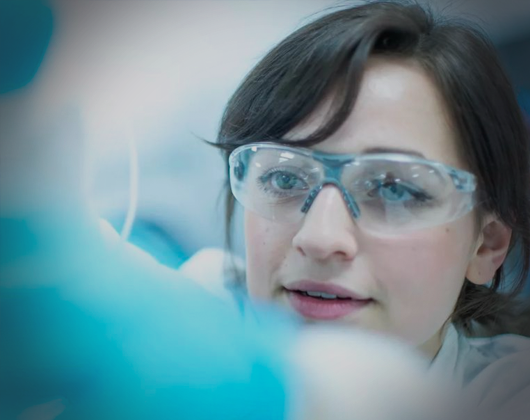As drug developers approach the pivotal milestone of starting their early-phase first-in-human clinical trial, they must be aware of the possible challenges when preparing for clinical manufacturing of their investigational medicinal product (IMP).
Clinical materials manufacturing, involving supplying the right quantities of the IMP at the right time while maintaining high quality and safety standards, is crucial to maximize the likelihood of a successful clinical trial. The processes involved in clinical trial materials manufacturing require specific drug product manufacturing expertise, facilities and equipment, careful attention to planning, and a great deal of flexibility for success.
Frequently asked questions about clinical manufacturing with our expert Kieran Edwards, Head of Manufacturing at Quotient Sciences
Quotient Sciences are experienced in clinical materials manufacturing, and partner with our customers to provide an approach to clinical manufacturing and supply that best reflects their clinical study design and timelines.
Each program we offer is customized to meet the unique requirements of each program, using flexible manufacturing approaches to produce only the products needed, which adds efficiency and minimizes waste. Our expertise includes both non-potent and high-potency manufacturing, enabling us to assist our customers in progressing quickly through clinical development. Additionally, we can efficiently scale up production to meet the demands of later clinical trial phases, ensuring a smooth transition to larger-scale manufacturing and commercialization.
In this article, Kieran Edwards, Head of Manufacturing at Quotient Sciences, answers some frequently asked questions about clinical manufacturing.
What is clinical manufacturing, and how does it differ from commercial manufacturing?
Clinical manufacturing, also known as clinical trial material (CTM) manufacturing and clinical trial material, is the process of turning an investigational material/active ingredient into an IMP, for dosing within a Phase I, Phase II, or Phase III clinical trial setting.
Commercial drug product manufacturing batches, taking place post-Phase III clinical trials, are typically larger scale to create drug products for the market. In contrast, clinical trial material manufacturing is typically a smaller-scale process that may only need to be performed once. Flexibility is required, something which we excel at in Quotient Sciences, as there are many unknowns around the IMP and the scope of a project can change in an instant.
What are the regulatory guidelines for clinical manufacturing, and how do you comply with them to ensure safety and quality?
All clinical manufacturers must conform to current Good Manufacturing Practice (cGMP) guidelines and work in line with the regulatory authority in which the IMP will be dosed. These guidelines cover all aspects of the manufacturing process, from development to making, testing, and shipping a product.
Both safety and quality are built into the Quotient Sciences culture and systems by design. Our quality management systems (QMS) include quality policies, processes, and procedures, as well as teams of highly skilled workers, focused on continually improving and adhering to the latest regulatory guidelines. Quotient Sciences provides comprehensive training for personnel, performs numerous assessments and observations, and utilizes the latest flexible containment measures in order to protect both the employees and facilities, to highlight just a few areas.
How should a drug developer plan ahead for clinical manufacturing?
At the point that a project is signed, we keep an open mind and start thinking forward to later stages of development, clinical manufacturing and dosing requirements. We take a collaborative approach for study deliverables and early on in a project, identification is required for novel excipients and equipment, which will allow the correct routes of onboarding to be implemented. Any process that requires significant technical input will have the development and manufacturing teams working in tandem.
For clinical batches, we are expected to create and assign a study box with all required materials that is based on the bill of materials generated from the formulation development work. These will have to be fully released through Quotient Sciences' systems, with enough quantity and expiry to last the entirety of the study. Study-specific paperwork is also generated in parallel, based on all the information and knowledge gained from the process up to that point
What are the challenges of clinical manufacturing for global patient studies, and how does Quotient Sciences overcome them?
Clinical manufacturing for global patient studies presents unique challenges, many of them related to packaging and shipment, such as:
- Importation challenges into different territories
- Shipping lead times
- The formulation of the drug product
- Special considerations for shipping and handling radioactive or dangerous goods products, as well as for controlled temperature products
We address importation hurdles by staying informed about local shipping regulations and collaborating with approved couriers. During study start-up, the team works with customers to manage applications for import licenses and establishes brokerage services in advance.
Understanding the clinical study protocols and timing is another crucial part of navigating clinical manufacturing. This is especially the case for short lead times between manufacturing requests and patient dosing. For studies involving specific shipping lanes, such as those into the EU post-Brexit, careful logistical planning is essential to ensure efficiency and compliance with all regulations, particularly regarding products that may contain animal-derived ingredients.
The specific formulation of drug products can necessitate shipping studies to evaluate their stability under transit conditions, especially for fragile items or those requiring controlled temperatures. We have validated shipping containers and temperature monitoring devices to maintain compliance during transit. For more sensitive products, such as radioactive or dangerous goods, a tailored approach is taken based on individual territory requirements. Additionally, for any territory that is new to Quotient Sciences, a shipping study will be considered on a case-by-case basis.
For example, oral solutions contained in glass bottles that need to be shipped to a long-haul destination may warrant a shipping study to be performed to ensure that the product does not leak or to ensure that the pressure from air freight does not have an effect on the product.
Our specialized team, dedicated to managing the global supply and distribution of clinical trial materials, ensure that studies proceed smoothly and that all materials are delivered as needed for ongoing projects.
What are the benefits of integrating adaptive clinical manufacturing with formulation development and clinical testing?
Our history and expertise in integrating real-time adaptive manufacturing with clinical dosing enable us to manufacture, package, and release products in a matter of days or weeks rather than months. This means that we can maximize flexibility around the batch size and timing supply to the clinic in response to emerging clinical data, accelerating clinical development timelines.
The main benefit is reducing the time to get a drug product through development and into a clinical trial, ultimately providing significant cost savings for a customer. When services are closely integrated. the knowledge of the entire drug development process is kept whole. This is best demonstrated by the Quotient Sciences Translational Pharmaceutics® platform, which integrates drug product manufacturing and clinical testing within the same organization.
Learn about the Quotient Sciences Translational Pharmaceutics® platform and download our latest info sheet.

